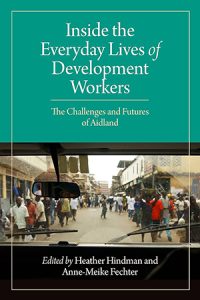Inside the Everyday Lives of Development Workers: The Challenges and Futures of Aidland

Editor(s): Heather Hindman & Anne-Meike Fechter
Publisher: Kumarian Press
Year of Publication: 2011
Print Length: 240 pages
Genre: Academic / Edited Books, Non-Fiction / Social Science
Area: Ghana, Madagascar, Indonesia, Nepal
Topic: Altruism, Development, Humanitarian Action, Social/Aid Workers, Lived Experience, Interculturalism, Rural, Colonialism & Post-Colonialism, Culture & Society
Explores the social and cultural worlds shaping aid workers and their development practices
Shows how aid workers in the “field” negotiate a variety of often conflicting and contradictory imperatives of the development system
Much and warranted attention is paid to the lives of aid recipients – their household lives, saving habits, gender relations, etc. It’s held that a key to measuring the effectiveness of aid is contained in such details. Rarely, however, is the lens turned on the lives of aid workers themselves. Yet the seemingly impersonal network of agencies and donors that formulate and implement policy are composed of real people with complex motivations and experiences that might also provide important lessons about development’s failures and successes.
Hindman and Fechter break new ground by illuminating the social and cultural world of the aid agency, a world that is neglected in most discussions of aid policy. They examine how aid workers’ moral beliefs interlink and conflict with their initial motivations, how they relate to aid beneficiaries, their local NGO counterparts, and other aid workers, their views on race and sexuality, the effect of transient lifestyles and insider language, and the security and family issues that come with choosing such a career. Ultimately, they arrive at a more comprehensive understanding of development processes that acknowledges a rich web of relationships at all levels of the system.
Table of Contents
1. Introduction — Heather Hindman and Anne-Meike Fechter
2. False Binaries: Altruism and Selfishness in NGO Work — Sara de Jong
3. Maintaining Independence: The Moral Ambiguities of Personal Relations Among Ghanaian Development Workers — Thomas Yarrow
4. Intercultural Encounters, Colonial Continuities and Contemporary Disconnects in Rural Aid: An Ethnography of Development Practitioners in Madagascar — Ritu Verma
5. Orienting Guesthood in the Mennonite Central Committee, Indonesia — Philip Fountain
6. Everywhere and Everthrough: Rethinking Aidland — Keith Brown
7. Anybody at Home? The Inhabitants of Aidland — Anne-Meike Fechter
8. Dealing with Danger: Risk and Security in the Everyday Lives of Aid Workers — Silke Roth
9. The Hollowing Out of Aidland: Subcontracting and the New Development Family in Nepal — Heather Hindman
10. Epilogue: Who Is International Aid? Some Personal Observations — Raymond Apthorpe
Contributos
Index

Heather Hindman is Associate Professor at Department of Asian Studies, University of Texas at Austin. She started her academic career as a scholar of Nepal. Her early work on elite ethnic organizations in Kathmandu elided into an interest in the foreign diplomats and aid workers with whom they often socialized. She has published on the influence of U.S. foreign policy on aid priorities, the training of expatriate personnel, the essentialization of culture and the hidden labor of elite transnational women. In addition, she is active in refugee support, the Transnationalism Project at the University of Chicago and the Graduate Consortium on Women’s Studies.
Source: https://www.amazon.com/Inside-Everyday-Lives-Development-Workers/dp/1565493230
More from Heather Hindman in this library, click here.

Anne-Meike Fechter is Professor of Anthropology and International Development at Sussex University. Her early work focused on Euro-American corporate expatriates in Southeast Asia. The resulting monograph, entitled Transnational Lives: Expatriates in Indonesia (Routledge 2007), analyzes Euro-Americans working in Jakarta within the context of transnationalism and globalisation. More recently, she has begun a research project on aid workers as mobile professionals with particular regard to Cambodia, which follows their careers, life courses and experiences of place while on an overseas posting. She is also editor, with Anne Coles, of the volume Gender and Family among Transnational Professionals (Routledge 2007), and with Katie Walsh, of a recent special issue of the Journal of Ethnic and Migration Studies (2010) which presents studies in the framework of Post/colonial Encounters: Expatriates in Comparative Perspective.
Source: https://www.amazon.com/Inside-Everyday-Lives-Development-Workers/dp/1565493230
More from Anne-Meike Fechter in this library, click here.
